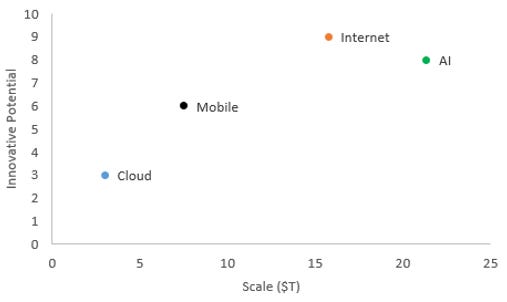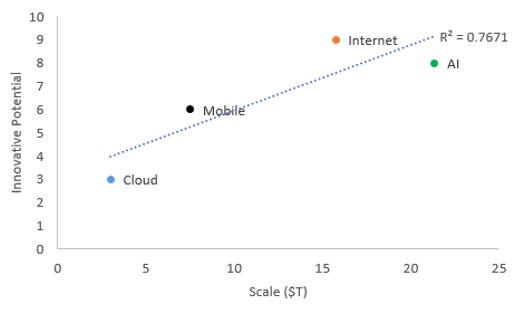Will AI be the Biggest Platform Shift Yet?
A comparison of Internet vs. Cloud vs. Mobile vs. AI
If you listen to tech podcasts, browse Twitter / X, or read big tech earnings calls you’ve likely heard many express how “AI will be the biggest platform shift since the internet.” While this view is arguably consensus at this point, I’ve yet to see anyone clearly articulate why. Of course, there’s ample mention of the revolutionary use cases AI will enable, but technologies like the internet, mobile, and cloud were revolutionary in their own right. Nowhere have I seen a direct comparison of those revolutions head-to-head (if I’m missing it please let me know!), so I’ve decided to create my own. In doing so I hope to validate the common refrain regarding the magnitude of AI’s potential. Let’s dive in!
First, a framework
Before making any head-to-head comparisons, it helps to establish the basis against which we’re evaluating these platform shifts. Undoubtedly, scale matters. Platform shifts that drive more economic value should in some sense be thought of as “bigger.” However, I don’t think scale tells the whole story. It certainly doesn’t encapsulate why people are SO excited about AI right now. In addition to scale, I think there’s an equally important concept of “innovative potential.” Essentially, does this technology unlock new solutions / use cases / business models that weren’t possible with existing technology? While this metric is admittedly squishier than scale, I think it helps dimensionalize what folks mean when they talk about the overarching impact of a new platform shift.
With “scale” and “innovative potential” as our two evaluation criteria we can plot each platform shift on a 2x2 and make apples-to-apples comparisons.
Assessing Scale
I could spend days sizing a bottom-up build of use cases enabled by these technologies or take a top-down approach and identify pools of opportunities from first principles, but fortunately that work has already been done for me. McKinsey has been publishing estimates of economic value created by breakthrough technology for years, and we can use their estimates in our analysis. While multiple different sources have attempted to size the value of these platform shifts, I’m using McKinsey for each technology for two main reasons:
Having reviewed their methodology, I believe they take a thoughtful approach to each estimate.
By leveraging the same source I hope to reduce definitional inconsistencies that would make comparisons across technologies less applicable.
McKinsey’s estimates of value creation are as follows:
Internet: $16T
Cloud: $3T
Mobile: $8T
AI: $21T
When plotted against our 2x2 (without taking a view yet on Innovative Potential) we can start to see why so many people are so excited about AI.
Assessing Innovative Potential
As we’ve discussed, scale is just one piece of the puzzle. To truly get a sense of the impact of each platform shift we have to assess the degree to which they unlock new solutions, use cases, or business models. Unfortunately, there’s no off-the-shelf report that gets at this point, so we’ll have to create our own. To do so let’s juxtapose a few of the biggest winners vs. the biggest losers of each shift to tease out just how much innovation was unlocked.
Internet
Winners: Companies like Amazon, eBay, and Google come to mind as key winners of the internet platform shift. For Amazon and eBay their success came from leveraging the internet to shrink the world and enable individualized commerce across distances previously insurmountable. Google’s indexing of search allowed them to shrink the world of information, which they then used to create a next-generation advertising model that is still one of the best businesses in the world.
Losers: Traditional retail, print media, and legacy intermediary services (e.g., travel agencies) were some of the biggest losers of the internet era. In each case, the ability of the internet to abstract from the physical world and deliver more value to customers digitally left these businesses completely disrupted.
Innovative Potential Score: Given just how many aspects of life the internet enhances or enables today, it’s difficult to think of a more impactful modern innovation. Pre-internet there was no conceivable way I could trade with someone just a few states away, yet by the time I was 8 I was buying and selling soccer jerseys from China on eBay with ease. Despite this tremendous impact, I remain open to the possibility of even more groundbreaking innovation in the future, so we’ll give the internet a 9.
Cloud
Winners: Undoubtedly the hyperscalers (AWS, Azure, and GCP) are the biggest winners of the cloud era, along with cloud applications like Salesforce and ServiceNow. The hyperscalers allowed enterprises to outsource the problem of managing physical servers and networking infrastructure, and cloud applications enabled businesses to access their software digitally without needing to worry about installation or maintenance. Together these innovations enabled the Software-as-a-Service (SaaS) business model that characterizes many of the most highly valued businesses today.
Losers: The losers of the cloud era can be thought of the legacy incumbents on both the physical infrastructure and on-premise application sides. Server providers like HPE or Dell EMC were directly dropped for outsourced infrastructure from hyperscalers, and on-prem software providers like Siebel and BMC were replaced in a relatively like-for-like swap with cloud applications.
Innovative Potential Score: Whereas the internet enabled a plethora of entirely new use cases (e.g., cross-continent individual commerce, instant access to distributed knowledge), cloud was more about improving upon existing use cases. Cloud does get some benefit for enabling the incredible SaaS business model, but the dynamic of like-for-like replacements makes the era less innovative than other platform shifts. Thus, I would assign cloud an innovative potential score of 3.
Mobile
Winners: In addition to Apple (the obvious mobile winner) companies like Meta and Uber were major beneficiaries of the shift to mobile. Apple’s success came from making the physical devices that enabled a new frontier of internet use cases, and Meta and Uber were responsible for leveraging those devices to create some of the most valuable applications of the era (social media and real-time location services).
Losers: Of course physical camera makers and taxis lost share to the mobile winners, but I would argue the concept of losers in the mobile era extends much broader. In some sense, any company that failed or was slow to adopt mobile use cases was a loser. Legacy banks who failed to adapt faced disruption from Neobanks with slick mobile apps, and radio stations who ignored mobile streaming were left in the dust.
Innovative Potential Score: While the internet shrank the world, mobile made that shrunken world much more accessible. Apple’s innovation powered the Web 2.0 era, and for the losers of mobile era be characterized by those who didn’t adapt speaks volume to the degree of innovation we experienced. However, given mobile was mostly about changing the way we interact with the internet, it can’t be as revolutionary as the internet itself. To say the shift to mobile was twice as innovative as cloud and about half as impactful as the internet feels directionally accurate, so we’ll assign mobile a score of 6.
AI
It's far too early to tell who the winners and losers of the AI platform shift will be, but with the breadth of applicability AI possesses there are likely to be many. One of the dynamics of AI that is so exciting is the sheer amount of incredible use cases it’s already enabling. AlphaFold has shown how AI can be leveraged to quickly make protein structure predictions that may hold the secrets to elusive drug discovery in areas like cancer research, and DeepL’s AI-powered translation service allows individuals who do not share a common tongue to communicate with each other in real time. Across industries AIs powerful enhancements are likely to fundamentally change how we allocate labor and resources to tackle problems, and I would bet we will see new AI-centric business models emerge in the coming years.
Despite this excitement, I must admit many of the AI use cases we see today are enhancements of existing technologies rather than net new solutions in their own right. To be fair, these enhancements are something like 100-1,000x more powerful than their predecessors, but they are still just in-kind improvements. Shopify’s AI sidekick and Microsoft’s Office copilot are just two of many examples. As a result, I’m not yet ready to say AI has more innovative potential than the internet.
However, the gains in productivity we will likely enjoy thanks to AI are truly staggering, and the new solutions AI will help us develop to the world’s toughest problems across disciplines are seemingly unbounded. All told I would place AI closer to the internet but still behind at an 8, with a caveat this can change as we continue to learn more.
Comparing platform shifts
If we add these Innovative Potential scores to our 2x2, we get the following output:
From this analysis I’m struck by three major takeaways:
AI really is a bigger deal than cloud or mobile and even has the potential to surpass the internet in significance.
The potential impact of AI is astonishing. I have spent the majority of my career thinking about cloud software, and that opportunity has always felt enormous to me. To see AI as multiples larger and more impactful than cloud is eye-opening.
There appears to be a clear relationship between innovative potential in a platform shift and the value it creates1. This is obviously super low N and not scientific, but it’s interesting to consider how innovation may drive economic value. Hopefully this insight inspires the next great builder to innovate even more!
I went ahead and plotted a line of best fit on the chart, and the R2 is 0.77! See below:





Extremely well written, and well thought out. You could become a technology journalist, futurist or technology mutual fund manager if you so choose! Perhaps all three!
Have loved reading these since the beginning! Are you considering AI to mean roughly "language models" or counting on even more scientific progress to come?
If we want to be specific about the current wave of AI, it's all about modeling language-like tasks (don't get me wrong, it's amazing how many tasks fall into this category) but still not the same as "computers that are similar to the human brain". I could imagine another AI breakthrough in 10 years that expands AI's capabilities to a totally new class of tasks (e.g. reinforcement learning for robots that physically move through the world, like a robot chef with mechanical arms in a restaurant). The word AI is so broad though.